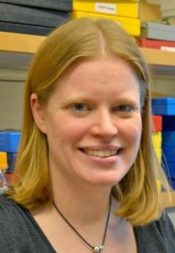
Tricia Burdo, Ph.D.
Associate Director, Rutgers Institute for Translational Medicine and Science
Professor of Medicine, Robert Wood Johnson Medical School
Rutgers Institute for Translational Medicine and Science
Child Health Institute of New Jersey
Rutgers, The State University of New Jersey
89 French Street, Suite 4275
New Brunswick, NJ 08901
Education: PhD, Cell and Molecular Biology, Penn State College of Medicine, Hershey, PA
BA, Biology, Saint Anselm College, Manchester, NH
Postdoctoral Fellowship: The Scripps Research Institute, San Diego, CA
Dr. Tricia Burdo, Ph.D. is Professor of Medicine and Associate Director at RITMS. Dr. Burdo is member of the International Society for Nuerovirology, a member of the International Society of NeuroImmunolgy as well as a member of the Society for Neuroscience.
Research Focus:
My lab focuses on the role of ongoing chronic immune activation and the role of monocyte/macrophages in HIV-associated peripheral neuropathy (HIV-PN), HIV-associated neurocognitive disorders (HAND) and cardiovascular disease (CVD). It is becoming clear that HIV+ patients on effective antiretroviral therapy (ART) who have non-detectable plasma virus, still have persistent immune activation that includes monocytes and macrophages, accelerated immune aging and senescence, and other co-morbidities including an increased incidence of coronary atherosclerosis and is of great interest in the lab.
We use the SIV-infected rhesus macaque model to study the roles of monocyte traffic, macrophage activation and virus in peripheral neuropathy with and without ART. We have shown that traffic of monocytes (as measured by BrdU+ monocytes) is critical for histopathology in dorsal root ganglia (DRG) and correlates to loss of intraepidermal nerve fibers (IENFD).
We have pioneered work on soluble CD163 (sCD163) as a marker of chronic immune activation in SIV and HIV infection. We have showed that monocyte egress out of the bone marrow correlates with sCD163 in plasma and severity of SIV encephalitis (SIVE). sCD163 was elevated in the plasma of both chronic and early HIV+ patients, which decreased significantly with ART. However, sCD163 in chronically infected patients did not come back to levels found in uninfected demonstrating ongoing monocyte/macrophage activation even with suppressive ART.
The mechanisms of HAND persistence in the ART era are not well understood. It is likely that events occurring early in the CNS set the stage for a future neurological disease that emerges during chronic infection with or without effective ART. We have shown that sCD163 is elevated in HIV+ individuals with HAND and suggest that the persistence of HAND is likely mediated by continual immune activation that includes monocytes and macrophages.
More recently we have been working in conjunction with investigators at Mass General Hospital on immune markers of cardiac disease during HIV infection. We have shown that sCD163 correlated with non-calcified vulnerable plaque. In addition, sCD163 also correlated with the number of inflammatory macrophages in the ascending aorta of HIV infected individuals, as shown by FDG-PET imaging. Currently, Dr. Burdo is an Immunologist measuring immune biomarkers in the Randomized Trial to Prevent Vascular Events in HIV (REPRIEVE) clinical trial (http://reprievetrial.org/). Dr. Burdo is also the lead Immunologist on an ancillary study to examine Sex-Specific Mechanisms of Cardiovascular Disease Risk and Risk Reduction, in which we will assess among HIV-infected individuals ages 40-75 sex-based differences in immune activation and statin-induced immunomodulation in relation to clinical cardiovascular disease events (http://followyourheart.reprievetrial.org/). These are current ongoing projects in the lab.
Selected Publications:
- Ali Ahmed, Jeff Taylor, Sithara Deshan Diunugala, Rachel Lau, Joyce Ching-Jung Lai, Michael Louella, Jeff Berry, Tricia H. Burdo, Michael J. Peluso, Lynda Dee, and Karine Dubé. “Sometimes They Exclude Us because of Our Age—That’s Not Right”: Perceptions of HIV Cure Research Among Diverse Long-Term Survivors in the United States. AIDS Research and Human Retroviruses. 2025 Apr 23. doi: 10.1089/aid.2024.0117. Online ahead of print.
- Coronary Plaque, Inflammation, Subclinical Myocardial Injury, and Major Adverse Cardiovascular Events in the REPRIEVE Substudy. JACC: Advances. 2025 May 14;4(6 Pt 1):101781. doi: 10.1016/j.jacadv.2025.101781. Online ahead of print.
- Caocci M, Niu M, Fox HS, Burdo TH. HIV Infection Drives Foam Cell Formation via NLRP3 Inflammasome Activation. Int J Mol Sci. 2024 Feb 17;25(4):2367. doi: 10.3390/ijms25042367.PMID: 38397063
- Relationships between plasma neurofilament light chain protein, cognition, and brain aging in people with HIV. AIDS. 2024 Jun 1;38(7):955-962. doi: 10.1097/QAD.0000000000003861. Epub 2024 Feb 6. PubMed PMID: 38329137; PubMed Central PMCID: PMC11062811.
- The CARD8 inflammasome dictates HIV/SIV pathogenesis and disease progression. Cell. 2024 Feb 29;187(5):1223-1237.e16. doi: 10.1016/j.cell.2024.01.048. PubMed PMID: 38428396; PubMed Central PMCID: PMC10919936.
- Effects of Pitavastatin on Coronary Artery Disease and Inflammatory Biomarkers in HIV: Mechanistic Substudy of the REPRIEVE Randomized Clinical Trial. JAMA Cardiol. 2024 Apr 1;9(4):323-334. doi: 10.1001/jamacardio.2023.5661.PMID: 38381407
- Correction: Preclinical safety and biodistribution of CRISPR targeting SIV in non-human primates. Gene Ther. 2024 Jul;31(7-8):434-435. doi: 10.1038/s41434-023-00438-6.PMID: 38212405
- Neuroinflammation in the Dorsal Root Ganglia and Dorsal Horn Contributes to Persistence of Nociceptor Sensitization in SIV-Infected Antiretroviral Therapy-Treated Macaques. Am J Pathol. 2023 Dec;193(12):2017-2030. doi: 10.1016/j.ajpath.2023.08.014. Epub 2023 Sep 19.PMID: 37734588
- Preclinical safety and biodistribution of CRISPR targeting SIV in non-human primates. Gene Ther. 2024 May;31(5-6):224-233. doi: 10.1038/s41434-023-00410-4. Epub 2023 Aug 17.PMID: 37587230
- Transmitted/founder SHIV.D replicates in the brain, causes neuropathogenesis, and persists on combination antiretroviral therapy in rhesus macaques. Retrovirology. 2023 Aug 10;20(1):13. doi: 10.1186/s12977-023-00628-5. PubMed PMID: 37563642; PubMed Central PMCID: PMC10413509.
- Adaptation of a transmitted/founder simian-human immunodeficiency virus for enhanced replication in rhesus macaques. PLoS Pathog. 2023 Jul;19(7):e1011059. doi: 10.1371/journal.ppat.1011059. eCollection 2023 Jul. PubMed PMID: 37399208; PubMed Central PMCID: PMC10348547.
- CRISPR editing of CCR5 and HIV-1 facilitates viral elimination in antiretroviral drug-suppressed virus-infected humanized mice. Proc Natl Acad Sci U S A. 2023 May 9;120(19):e2217887120. doi: 10.1073/pnas.2217887120. Epub 2023 May 1. PubMed PMID: 37126704; PubMed Central PMCID: PMC10175831.
